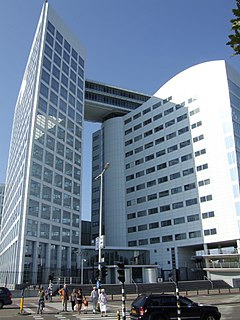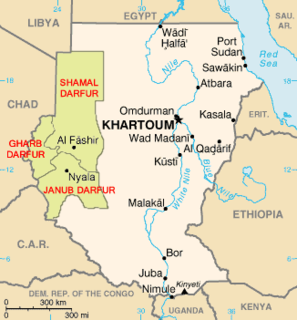
The United Nations Security Council (UNSC) is one of the six principal organs of the United Nations (UN), charged with ensuring international peace and security, accepting new members to the United Nations and approving any changes to its charter. Its powers include the establishment of peacekeeping operations and international sanctions as well as the authorization of military actions through resolutions – it is the only body of the United Nations with the authority to issue binding resolutions to member states. The council held its first session on 17 January 1946.
A United Nations Security Council resolution is a UN resolution adopted by the fifteen members of the Security Council; the UN body charged with "primary responsibility for the maintenance of international peace and security".

United Nations Security Council Resolution 478, adopted on 20 August 1980, is one of seven UNSC resolutions condemning Israel's attempted annexation of East Jerusalem. In particular, UNSC res 478 notes Israel's non-compliance with UNSC res 476 and condemned Israel's 1980 Jerusalem Law which declared Jerusalem to be Israel's "complete and united" capital, as a violation of international law. The resolution states that the Council will not recognize this law, and calls on member states to accept the decision of the council. This resolution also calls upon member states to withdraw their diplomatic missions from the city.

United Nations Security Council resolution 1422, adopted unanimously on 12 July 2002, after noting the recent entry into force of the Rome Statute of the International Criminal Court, the Council granted immunity from prosecution by the International Criminal Court (ICC) to United Nations peacekeeping personnel from countries that were not party to the ICC.
A United Nations resolution is a formal text adopted by a United Nations (UN) body. Although any UN body can issue resolutions, in practice most resolutions are issued by the Security Council or the General Assembly.

The United Nations Security Council "veto power" refers to the power of the permanent members of the UN Security Council to veto any "substantive" resolution. A permanent member's abstention or absence does not prevent a draft resolution from being adopted. This veto power does not apply to "procedural" votes, as determined by the permanent members themselves. A permanent member can also block the selection of a Secretary-General, although a formal veto is unnecessary since the vote is taken behind closed doors.
Chapter VII of the United Nations Charter sets out the UN Security Council's powers to maintain peace. It allows the Council to "determine the existence of any threat to the peace, breach of the peace, or act of aggression" and to take military and nonmilitary action to "restore international peace and security".

The United Nations Regional Groups are the geopolitical regional groups of the Member States of the United Nations. Originally, United Nations Member States were unofficially grouped into five geopolitical regional groups. However, what began as an informal means of sharing the distribution of posts for United Nations bodies quickly took on a much more expansive role. Depending on the context, the regional groups control elections to United Nations-related positions, on the basis of geographic representation, as well as coordinate substantive policy, and form common fronts for negotiations and voting.

United Nations Security Council resolution 1267 was adopted unanimously on 15 October 1999. After recalling resolutions 1189 (1998), 1193 (1998) and 1214 (1998) on the situation in Afghanistan, the Council designated Osama bin Laden and associates as terrorists and established a sanctions regime to cover individuals and entities associated with Al-Qaida, Osama bin Laden and/or the Taliban wherever located.
The Al-Qaida Sanctions Committee was established on 15 October 1999, pursuant to UN Security Council Resolution 1267. Initially dealing with both al-Qaeda and the Taliban, hence previously known as the Al-Qaida and Taliban Sanctions Committee, it was split on 17 June 2011, creating the new Taliban Sanctions Committee to separately deal with the Taliban.
The following outline is provided as an overview of and topical guide to the United Nations:

United Nations Security Council Resolution 1860, adopted on January 8, 2009, after recalling resolutions 242 (1967), 338 (1973), 1397 (2002), 1515 (2003) and 1850 (2008) on the Israeli–Palestinian conflict, the Council called for an immediate ceasefire in the Gaza War following 13 days of fighting between Israel and Hamas.

United Nations Security Council Resolution 1691, regarding the accession of Montenegro to the United Nations, was adopted without a vote on 22 June 2006. In the resolution, after examining the country's application for membership, the Council recommended to the General Assembly that it be admitted.

United Nations Security Council resolution 1387, adopted unanimously on 15 January 2002, after recalling previous resolutions on Croatia, including resolutions 779 (1992), 981 (1995), 1088 (1996), 1147 (1998), 1183 (1998), 1222 (1999), 1252 (1999), 1285 (2000), 1307 (2000), 1357 (2001) and 1362 (2001), the Council authorised the United Nations Mission of Observers in Prevlaka (UNMOP) to continue monitoring the demilitarisation in the Prevlaka peninsula area of Croatia for six months until 15 July 2002. It was the first Security Council resolution adopted in 2002.

United Nations Security Council resolution 1454, adopted on 30 December 2002, after recalling all previous resolutions on Iraq, including resolutions 661 (1991), 986 (1995), 1284 (1999), 1352 (2001), 1360 (2001), 1382 (2001), 1409 (2002) and 1447 (2002) concerning the Oil-for-Food Programme, the Council adjusted the list of restricted goods and procedures for its implementation under the Oil-for-Food Programme. It was the final Security Council resolution adopted in 2002.

United Nations Security Council Resolution 1651, adopted unanimously on 21 December 2005, after recalling previous resolutions on the situation in Sudan, particularly resolutions 1556 (2004) and 1591 (2005), the Council extended the mandate of an expert panel monitoring sanctions against and violations of human rights in the Darfur region until 29 March 2006. It was the last Security Council resolution adopted in 2005.

United Nations Security Council Resolution 2016 was unanimously adopted on 27 October 2011. Recognizing the "positive developments" in Libya after the Libyan Civil War and the death of Muammar Gaddafi, the resolution set a date of termination for the provisions of Security Council Resolution 1973 which allowed states to undertake "all necessary measures" to protect civilians and which formed the legal basis for military intervention by a number of foreign states. The termination date was set at 23:59, Libyan local time on 31 October 2011. The no-fly zone created with Resolution 1973 was also lifted on that date.
United Nations Security Council Resolution 2033 was unanimously adopted on 12 January 2012 on relationship with African Union relating to conflict prevention.

The Republic of Korea and the Democratic People's Republic of Korea were simultaneously admitted to the United Nations (UN) in 1991. On 8 August 1991, the UN Security Council passed United Nations Security Council Resolution 702, recommending both states to the UN General Assembly for membership. On 17 September 1991, the General Assembly admitted both countries under Resolution 46/1.














